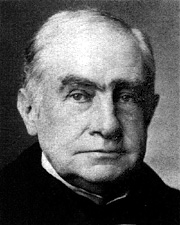Justice Henry Billings Brown
Henry Brown was the associate Supreme Court justice that wrote the majority decision for Plessy v. Ferguson. Brown was appointed to the court by President Benjamin Harrison in 1891 and is considered a conservative; his specialty was admiralty and patent law (1). Brown was a supporter of the War and of Lincoln, but did not serve; he hired a substitute, a common practice then.

Legal historian Joel Goldfarb succiently described the Justice as someone who "usually took the center position. He was neither a liberal nor a reactionary, neither an extreme nationalist nor a states' rights advocate, neither a representative of the plutocracy nor an exponent of progressivism. Brown did everything he could to prevent splits in the Court which he regarded as dangerous to its influence and dangerous to political stability . . . Like most Justices of the period, Brown himself dissented only when he felt it absolutely necessary. If there was any doubt in his mind concerning the propriety of a position, he voted with the majority even though on balance he might have come to a different result" (2).
Excertps from the majority decision are posted below, but the full account can be found only many websites, including the one I used, noted in the footnotes.
EXCERPTS:
“If the civil and political rights of both races be equal, one cannot be inferior to the other civilly or politically. If one race be inferior to the other socially, the constitution of the United States cannot put them upon the same plane.”
“We consider the underlying fallacy of the plaintiff's argument to consist in the assumption that the enforced separation of the two races stamps the colored race with a badge of inferiority. If this be so, it is not by reason of anything found in the act, but solely because the colored race chooses to put that construction upon it.”
“The argument also assumes that social prejudices may be overcome by legislation, and that equal rights cannot be secured to the negro except by an enforced commingling of the two races. We cannot accept that proposition. If the two races are to meet upon terms of social equality, it must be the result of natural affinities, a mutual appreciation of each other's merits, and a voluntary consent of individuals" (3).
FOOTNOTES:
1. Brook Thomas, ed., Plessy v. Ferguson: A Brief History with Documents (Boston: Bedford/ St. Martins, 1997), 183-84.
2. Leon Friedman and Fred L. Israel, eds., The Justices of the United States Supreme Court: Their Lives and Major Opinions, vol.2, 1969. Reprint. (New York: Chelsea House Publishers, 1997), 767-777. (Retrieved from <http://www.ca6.uscourts.gov/lib_hist/Courts/supreme/judges/brown/hbb-bio.html> on December 2, 2009.)
3.Excerpts taken from <www.milestonedocuments.com/document_detail.php?id =115&more=quotes> (retrieved on December 3, 2009.)
